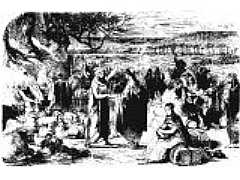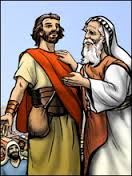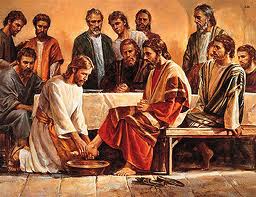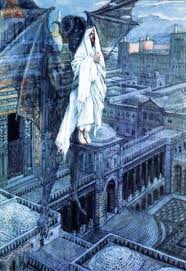|
Online links to scriptures (New International Version [NIV] unless otherwise stated) are shown in blue
| 3. FROM KINGS TO KINGDOM |
|
 Once again, I trust that you will not take offence as I write on this difficult subject. Nothing that I write here is personal, but rather, sets out the principles on which God's kingdom is meant to operate. I know many pastors, leaders and people in churches. In fact, I have been known to attend one myself, so am included also! What I am looking at here is the system that has evolved over the 2000 odd years since Jesus walked upon the earth to bring a new way of reestablishing our relationship with God, lost at the time of Adam and Eve's sin. Today 'The Way' is to be built upon direct relationship with the Father, made possible through the sacrifice of Jesus and lived out with guidance from the Holy Spirit. Once again, I trust that you will not take offence as I write on this difficult subject. Nothing that I write here is personal, but rather, sets out the principles on which God's kingdom is meant to operate. I know many pastors, leaders and people in churches. In fact, I have been known to attend one myself, so am included also! What I am looking at here is the system that has evolved over the 2000 odd years since Jesus walked upon the earth to bring a new way of reestablishing our relationship with God, lost at the time of Adam and Eve's sin. Today 'The Way' is to be built upon direct relationship with the Father, made possible through the sacrifice of Jesus and lived out with guidance from the Holy Spirit.
John 14:5-31
|
|
|
 Going right back in history to the time of Abraham, we see a man who had a direct relationship to God, hearing personally from Him on numerous occasions. Going right back in history to the time of Abraham, we see a man who had a direct relationship to God, hearing personally from Him on numerous occasions.
At the same time, there was upon the earth a mysterious king-priest, by the name of Melchizedek. Jewish tradition says he was Shem the son of Noah, while today, many believe he was a preincarnation of Jesus. While it would appear that he didn't die, he certainly is a 'type of a priest who lives forever'. (Easton Bible Dictionary) Abraham paid him a tithe once, after a successful battle. As Abraham was a nomad and Melchizedek likely lived around the Jerusalem area, their paths probably didn't cross very often. Abraham's primary relationship was with the Father and he received his visions and instructions directly from the Father.
Hebrews 7:1-7
|
|
|
 Time went on and when the people finally came out of Egypt they were initially led as a unified nation by Moses and Joshua, both, in different ways, types of Jesus. Time went on and when the people finally came out of Egypt they were initially led as a unified nation by Moses and Joshua, both, in different ways, types of Jesus.
These men were not kings nor priests, but prophets, ones whom again had a direct relationship with God.
After the death of Joshua, the individual tribes went their own ways. From time to time God would raise up judges at a tribal level, to deal with emergency situations the people got themselves in to. Finally the people decided that having a permanent king, like the surrounding nations had, would serve them better than waiting upon God appointed judges, to resolve their problems. Samuel was not pleased. Nor was God! However God reluctantly acceded to their request, all the time knowing the trouble it would get the people in to.
1 Samuel 8:1-22
|
|
|
 So we now had a situation where priesthood and kingship were separated, with King Saul and the Aaronic priesthood fulfilling different roles in society. Both good and bad kings and priests followed but the end result by the time Jesus came was that the people had been expelled from their land with only a remnant returning, and by the time of Jesus, under Roman rule. So we now had a situation where priesthood and kingship were separated, with King Saul and the Aaronic priesthood fulfilling different roles in society. Both good and bad kings and priests followed but the end result by the time Jesus came was that the people had been expelled from their land with only a remnant returning, and by the time of Jesus, under Roman rule.
|
|
|
 To summarise, the nation of Israel had passed through 2 kingdom ages. In the first kingdom age there was a king-priest in the form of Melchizedek while during the second kingdom age the kingship and the priesthood were separated. To summarise, the nation of Israel had passed through 2 kingdom ages. In the first kingdom age there was a king-priest in the form of Melchizedek while during the second kingdom age the kingship and the priesthood were separated.
Nothing controversial so far.
But it was soon to come! Jesus came as a radical to turn the world upside down! Ongoing controversy between the ways of Jesus and the established religious and governmental systems has been the normal situation ever since!
Matthew 23:1-39
|
|
|
 The most remarkable thing about the ministry of Jesus was that He led by example but did not rule in the way we, as human leaders, like to do. The most remarkable thing about the ministry of Jesus was that He led by example but did not rule in the way we, as human leaders, like to do.
|
|
|
 Satan endeavoured to tempt Jesus, effectively the same way he succeeded in tempting Adam and Eve - to take power and control over the world. With Adam and Eve, their world was a garden, for Jesus, the whole earth. Satan endeavoured to tempt Jesus, effectively the same way he succeeded in tempting Adam and Eve - to take power and control over the world. With Adam and Eve, their world was a garden, for Jesus, the whole earth.
Adam and Eve forsook fellowship with God in return for power now. Jesus did not.
Matthew 4:1-11
|
|
|
 Jesus did not have any followers! What a statement to make! Jesus did not have any followers! What a statement to make!
|
|
|
 If we analyse the Scriptures carefully, we will see that Jesus always referred to those who sought to follow Him as brethren. They were known as sons (including male and female) of God or of the Father, or sons of the kingdom but never Jesus' sons. If we analyse the Scriptures carefully, we will see that Jesus always referred to those who sought to follow Him as brethren. They were known as sons (including male and female) of God or of the Father, or sons of the kingdom but never Jesus' sons.
When the people tried to make Jesus 'king' on Palm Sunday, He simply left town, choosing to go to Bethany rather than lead an insurrection.
Matthew 7:37-8a
|
|
|
 Many think Jesus was simply being humble when He continually gave all the credit for what He did to the Father. He didn't glorify Himself. All glory was given to the Father. But the reality is that His submission to and glorification of the Father was the very heart of His ministry. Many think Jesus was simply being humble when He continually gave all the credit for what He did to the Father. He didn't glorify Himself. All glory was given to the Father. But the reality is that His submission to and glorification of the Father was the very heart of His ministry.
As prophesied by Isaiah, Jesus was to come not as a ruler, but as a servant!
Isaiah 42:1-4
|
|
|
 Jesus came as God the Father's suffering servant, to do the work of the Father and give glory to Him. Jesus came as God the Father's suffering servant, to do the work of the Father and give glory to Him.
Isaiah 52:13-15
|
|
|
Jesus came, not to rule, but as the servant of the Father to do the Father's will, giving the Father all the glory for everything He did.
|
| <i>NEXT WEEK:</i> TRANSFORMATION OF THE CHURCH: <i>3. FROM KINGS TO KINGDOM</i> continues |
|
 As we look at the early church. As we look at the early church.
|
| A NOTE FROM DAVID |
|
 Living like Jesus - what a challenge for us! Living like Jesus - what a challenge for us!
Most of us would prefer to live like the kings and priests of the Old Testament. Indeed, that is how our church structure operates today.
May we put aside the old and learn to become true Jesus followers.
Extra-Biblical Historical Evidence for the LIFE, DEATH, and RESURRECTION of JESUS
ANCIENT NON-CHRISTIAN SOURCES
Cornelius Tacitus (55-120 AD), "the greatest historian" of ancient Rome:
"Consequently, to get rid of the report, Nero fastened the guilt and inflicted the most exquisite tortures on a class hated for their abominations, called Christians by the populace. Christus, from whom the name had its origin, suffered the extreme penalty during the reign of Tiberius at the hands of one of our procurators, Pontius Pilatus, and a most mischievous superstition, thus checked for the moment, again broke out not only in Judaea, the first source of the evil, but even in Rome, where all things hideous and shameful from every part of the world find their centre and become popular. Accordingly, an arrest was first made of all who pleaded guilty; then, upon their information, an immense multitude was convicted, not so much of the crime of firing the city, as of hatred against mankind. Mockery of every sort was added to their deaths. Covered with the skins of beasts, they were torn by dogs and perished, or were nailed to crosses, or were doomed to the flames and burnt, to serve as a nightly illumination, when daylight had expired. Nero offered his gardens for the spectacle, and was exhibiting a show in the circus, while he mingled with the people in the dress of a charioteer or stood aloft on a car. Hence, even for criminals who deserved extreme and exemplary punishment, there arose a feeling of compassion; for it was not, as it seemed, for the public good, but to glut one man's cruelty, that they were being destroyed."
Gaius Suetonius Tranquillas, chief secretary of Emperor Hadrian (117-138 AD):
"Because the Jews of Rome caused continous disturbances at the instigation of Chrestus, [Claudius] expelled them from the city."
"After the great fire at Rome [during Nero's reign] ... Punishments were also inflicted on the Christians, a sect professing a new and mischievous religious belief."
|
So until next week.......
MAY GOD BLESS YOU AND YOU BLESS GOD!
His servant and yours

Learn more about us at...
www.wwj.org.nz/about.php
|
A DAVID'S DOODLING
243. A believer loves the Lord, but the disciples love is unconditional.
David Tait
|
Check
out the WWJ website for….
More David's Doodlings: www.wwj.org.nz/dd.php
What We're All About: http://www.wwj.org.nz/about.php
PGIM! Weekly Encouragement Ezine�: http://www.wwj.org.nz/wwword.php
Reports on past Ministry visits: http://www.wwj.org.nz/diary.php
Eagles Fly High!: http://www.wwj.org.nz/eagle.php
|

 Once again, I trust that you will not take offence as I write on this difficult subject. Nothing that I write here is personal, but rather, sets out the principles on which God's kingdom is meant to operate. I know many pastors, leaders and people in churches. In fact, I have been known to attend one myself, so am included also! What I am looking at here is the system that has evolved over the 2000 odd years since Jesus walked upon the earth to bring a new way of reestablishing our relationship with God, lost at the time of Adam and Eve's sin. Today 'The Way' is to be built upon direct relationship with the Father, made possible through the sacrifice of Jesus and lived out with guidance from the Holy Spirit.
Once again, I trust that you will not take offence as I write on this difficult subject. Nothing that I write here is personal, but rather, sets out the principles on which God's kingdom is meant to operate. I know many pastors, leaders and people in churches. In fact, I have been known to attend one myself, so am included also! What I am looking at here is the system that has evolved over the 2000 odd years since Jesus walked upon the earth to bring a new way of reestablishing our relationship with God, lost at the time of Adam and Eve's sin. Today 'The Way' is to be built upon direct relationship with the Father, made possible through the sacrifice of Jesus and lived out with guidance from the Holy Spirit.  Going right back in history to the time of Abraham, we see a man who had a direct relationship to God, hearing personally from Him on numerous occasions.
Going right back in history to the time of Abraham, we see a man who had a direct relationship to God, hearing personally from Him on numerous occasions. Time went on and when the people finally came out of Egypt they were initially led as a unified nation by Moses and Joshua, both, in different ways, types of Jesus.
Time went on and when the people finally came out of Egypt they were initially led as a unified nation by Moses and Joshua, both, in different ways, types of Jesus. So we now had a situation where priesthood and kingship were separated, with King Saul and the Aaronic priesthood fulfilling different roles in society. Both good and bad kings and priests followed but the end result by the time Jesus came was that the people had been expelled from their land with only a remnant returning, and by the time of Jesus, under Roman rule.
So we now had a situation where priesthood and kingship were separated, with King Saul and the Aaronic priesthood fulfilling different roles in society. Both good and bad kings and priests followed but the end result by the time Jesus came was that the people had been expelled from their land with only a remnant returning, and by the time of Jesus, under Roman rule.  To summarise, the nation of Israel had passed through 2 kingdom ages. In the first kingdom age there was a king-priest in the form of Melchizedek while during the second kingdom age the kingship and the priesthood were separated.
To summarise, the nation of Israel had passed through 2 kingdom ages. In the first kingdom age there was a king-priest in the form of Melchizedek while during the second kingdom age the kingship and the priesthood were separated. The most remarkable thing about the ministry of Jesus was that He led by example but did not rule in the way we, as human leaders, like to do.
The most remarkable thing about the ministry of Jesus was that He led by example but did not rule in the way we, as human leaders, like to do.  Satan endeavoured to tempt Jesus, effectively the same way he succeeded in tempting Adam and Eve - to take power and control over the world. With Adam and Eve, their world was a garden, for Jesus, the whole earth.
Satan endeavoured to tempt Jesus, effectively the same way he succeeded in tempting Adam and Eve - to take power and control over the world. With Adam and Eve, their world was a garden, for Jesus, the whole earth.  Jesus did not have any followers! What a statement to make!
Jesus did not have any followers! What a statement to make!  If we analyse the Scriptures carefully, we will see that Jesus always referred to those who sought to follow Him as brethren. They were known as sons (including male and female) of God or of the Father, or sons of the kingdom but never Jesus' sons.
If we analyse the Scriptures carefully, we will see that Jesus always referred to those who sought to follow Him as brethren. They were known as sons (including male and female) of God or of the Father, or sons of the kingdom but never Jesus' sons. Many think Jesus was simply being humble when He continually gave all the credit for what He did to the Father. He didn't glorify Himself. All glory was given to the Father. But the reality is that His submission to and glorification of the Father was the very heart of His ministry.
Many think Jesus was simply being humble when He continually gave all the credit for what He did to the Father. He didn't glorify Himself. All glory was given to the Father. But the reality is that His submission to and glorification of the Father was the very heart of His ministry. Jesus came as God the Father's suffering servant, to do the work of the Father and give glory to Him.
Jesus came as God the Father's suffering servant, to do the work of the Father and give glory to Him.  As we look at the early church.
As we look at the early church.  Living like Jesus - what a challenge for us!
Living like Jesus - what a challenge for us!